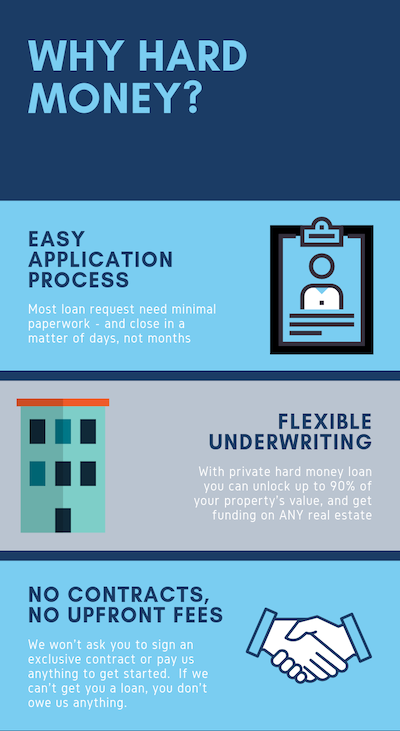Understanding How a Hard Cash Financing Can Assist You in Property Deals
In the world of property investment, recognizing the nuances of tough cash financings can considerably boost your financial technique. These loans, which highlight residential or commercial property value over typical credit score metrics, offer a special possibility for capitalists facing time-sensitive decisions or those with non-traditional economic histories. As we discover the key benefits and potential mistakes of difficult money funding, it comes to be noticeable that while these fundings supply a swift path to resources, they likewise carry distinct dangers that call for cautious consideration. What aspects should you evaluate before selecting this funding technique?
What Is a Difficult Money Car Loan?
A hard cash financing is a kind of financing secured by actual property, largely used by investors and designers for short-term financing requirements. Unlike conventional lendings, which count greatly on a borrower's credit reliability and earnings, tough money lendings concentrate mostly on the value of the security-- usually the realty being funded. This makes them a practical alternative for individuals that might not get standard financing as a result of poor credit report or time constraints.
Difficult cash fundings are generally used by exclusive lenders or financial investment teams, allowing for even more adaptability in conditions and terms. The authorization procedure is generally quicker than that of standard loans, typically taking just a few days, which is especially useful in busy property markets. Lending amounts can vary dramatically, often ranging from a few thousand bucks to numerous million, depending on the residential property's worth and the lending institution's policies.
Generally, these finances lug greater interest rates and much shorter settlement durations, usually ranging from one to three years. This financial tool is especially beneficial for actual estate capitalists looking to acquire, renovate, or flip buildings promptly, profiting from market opportunities that might not come through conventional financing methods.
Trick Advantages of Tough Cash Finances
Difficult money fundings provide unique advantages that can be particularly appealing to investor and designers. One of the most substantial benefits is their rate of authorization and financing. Unlike traditional lendings that might take months or weeks, difficult money loans can often be safeguarded within days, enabling investors to maximize time-sensitive possibilities.
Furthermore, hard cash lending institutions concentrate on the worth of the building as opposed to the consumer's credit report. This can be advantageous for financiers who might have less-than-perfect debt or those seeking to finance buildings that need substantial restorations. The flexibility of difficult cash fundings permits innovative funding services customized to the specific requirements of the task.
Another secret advantage is the capability to utilize homes for bigger investments. Financiers can make use of difficult cash lendings to obtain numerous buildings or to money significant remodellings, eventually maximizing their roi. Finally, hard money loans usually have less laws and less stringent demands than traditional funding, making them an eye-catching option for those looking for fast, flexible funding in the competitive property market.

Typical Conditions

Charges are likewise a vital component, with origination fees normally ranging from 1% to 5% of the car loan amount, and added closing expenses may apply. Hard Money Loans In Georgia. Repayment terms can differ, but many loans are structured with interest-only settlements during the term, adhered to by a balloon repayment at maturation. Collateral is normally linked directly to the property possession, providing protection for the lender
In addition, customers must be prepared to provide documents regarding their economic status and the residential or commercial property's useful source problem. Understanding these terms allows capitalists to make informed decisions and to involve effectively in the difficult cash lending process.
When to Use Difficult Cash Lendings,##.
Financiers usually turn to difficult cash loans when time is essential, specifically in competitive realty markets. These finances are usually processed rapidly, allowing buyers to confiscate chances that might otherwise slip away. When a home remains in high need, having accessibility to rapid financing can be a substantial benefit, making it possible for capitalists to make affordable offers without the delays related to standard financing.
Furthermore, difficult money finances are excellent for residential or commercial properties that may not receive conventional financing, such as those requiring extensive renovations or those with non-traditional building kinds. Hard Money Loans In Georgia. Capitalists aiming to deal with and turn buildings usually depend on these lendings to secure fast financing for both purchase and restoration expenses
Moreover, tough money finances can be useful for those looking to exploit on distressed residential or commercial properties or repossessions. On the whole, hard money finances offer as a useful financing alternative for capitalists that need fast accessibility to resources and are prepared to utilize their real estate ventures properly.
Potential Dangers and Considerations
While hard money financings official statement offer fast financing and adaptability genuine estate investments, they are not without their prospective dangers and considerations. One considerable issue is the higher rate of interest related to these car loans, which can range from 7% to 15% or more, depending see this site upon the lender and the perceived danger. This can cause significant prices over the car loan term, specifically if the financial investment does not yield fast returns.

In addition, lending institutions may require a considerable deposit, generally around 20% to 30%, which can strain liquidity. The lack of governing oversight in the tough money lending market might additionally subject borrowers to predative practices if they do not perform comprehensive due persistance on lending institutions.
Conclusion
In conclusion, hard cash finances work as a useful funding alternative for actual estate investors looking for fast accessibility to capital. These financings focus on home value, enabling individuals with differing credit histories to profit from time-sensitive possibilities. While the advantages include rapid financing and versatile terms, it is necessary to think about the greater rate of interest and brief repayment durations. A detailed assessment of possible dangers and benefits will certainly inform educated decision-making, ultimately improving investment techniques in property purchases.
Unlike typical lendings, which rely greatly on a debtor's credit reliability and income, difficult cash car loans concentrate primarily on the worth of the collateral-- generally the real estate being funded. Unlike traditional lendings that might take weeks or months, tough money fundings can often be secured within days, allowing capitalists to capitalize on time-sensitive chances.
Difficult cash lendings are largely temporary loans, usually ranging from six months to 3 years, designed for quick accessibility to funding. Rate of interest prices on tough cash lendings are generally higher than standard car loans, often falling between 8% and 15%, reflecting the greater danger taken by lending institutions.
In general, hard money financings offer as a practical financing choice for financiers who require quick access to funding and are prepared to utilize their real estate ventures properly.